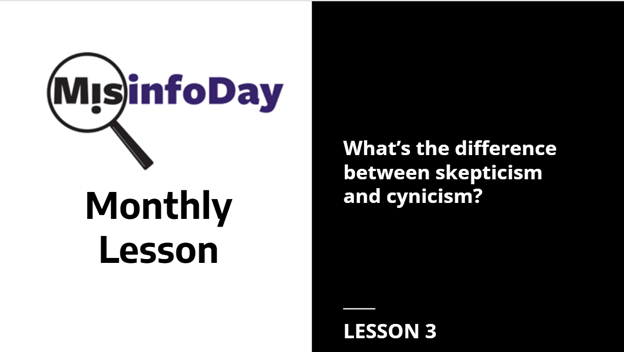Leading up to MisinfoDay 2022, the UW Center for an Informed Public, in partnership with the WSU Edward R. Murrow College of Communication, has launched a series of MisinfoDay Monthly video lessons for secondary students and educators.
In our January MisinfoDay Monthly video, Zach Branica, a senior at Ballard High School in Seattle, Washington, talks with Erica Weintraub Austin, the director of the Edward R. Murrow Center for Media and Health Promotion Research in the Edward R. Murrow College of Communication at Washington State University, about the difference between skepticism and cynicism in relation to how we approach information.
Time Stamp Questions:
- 1:05 What is the difference between skepticism and cynicism?
- 2:05 How can you catch yourself being overly critical and how should you go about changing that?
- 5:08 What are ways to vet info without being too cynical?
Scroll down to watch the video and access related classroom resources.
Sign up to receive future MisinfoDay Monthly lessons and other updates here. Each lesson will feature a video conversation between a high school student and a researcher along with related resources for your classroom.
Related Resources for Educators: Skepticism vs. Cynicism
Curiosity is an antidote to misinformation
This blogpost by CIP Co-founder Jevin West highlights the importance of being open to new information when trying to find the facts.
From the Center for an Informed Public
Civic Online Reasoning Intro Lessons
In the conversation above, Erica highlights the importance of asking questions before you accept something as true or assume something is false. In these three lessons from the Stanford History Education Group, students are introduced to foundational questions they can ask when deciding what to believe: Who’s behind the information? What’s the evidence? What do other sources say?
From the Stanford History Education Group (SHEG)
How to Use MisinfoDay Monthly Materials
Have your own “monthly MisinfoDay.” Choose a day each month to let students explore some or all of the resources. One option for this month: watch Zach and Erica’s conversation and follow it with excerpts from Jevin’s article on curiosity. Brainstorm ways students can act curiously when deciding what to believe, to “think like reporters rather than attorneys.” If your schedule allows more than one day, follow this with the Civic Online Reasoning intro lessons.
Find the Facts Fridays. Choose a day each week to explore one of the resources at the start of class. Short on time? Choose one resource to focus on for the month and break it down into shorter warm-up activities. For example: Each Friday, watch one question from Zach and Erica’s video.
Get inspired. Review the materials to level up your own understanding of the misinformation landscape and how to navigate it, then use your new knowledge to incorporate these concepts and skills into your current curriculum.

